News from Nancy!
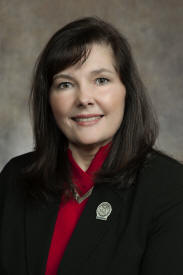
Hello Everyone!
I hope you are all doing well.
This E-Update will be focused on the recent announcement of the
Wisconsin Rural Initiative. The Initiative is a package of eight bills aimed
at improving health care, educational, workforce, and technological
opportunities in our rural communities. I will be going into more detail and
provide additional information about the Initiative below. I also want to
share a link to the
Rural Wisconsin Initiative column I recently wrote. I encourage you to
read it.
In addition, I
have been busy working on legislation and attending committee hearings so I
will also provide a legislative update on some of the legislation I have
authored.
Wisconsin Rural Initiative
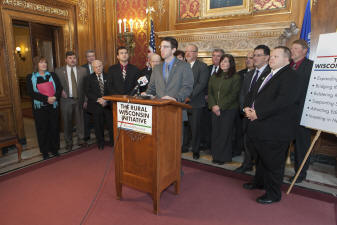 Recently,
I joined fellow outstate legislators from rural areas across the state to
announce the Rural Wisconsin Initiative. It will be ongoing and incorporate
suggestions from people across the state. To begin the conversation, the
Initiative will focus on improving education, workforce development,
technology, and healthcare in our rural communities. Recently,
I joined fellow outstate legislators from rural areas across the state to
announce the Rural Wisconsin Initiative. It will be ongoing and incorporate
suggestions from people across the state. To begin the conversation, the
Initiative will focus on improving education, workforce development,
technology, and healthcare in our rural communities.
Yesterday, the
eight bills that make up the Initiative had public hearings before the
Assembly Committee on Mining and Rural Development. The bills were met with
broad support from legislators, community organizations, and industry
professionals.
The eight
pieces of legislation boost funding for broadband expansion grants, increase
available resources for youth apprenticeship grants and tuition
reimbursement grants for apprenticeships, create rural opportunity zones,
expand a student loan repayment program for rural teachers, encourage STEM
education in rural school districts, bolster funding for the Wisconsin Rural
Physician Residency Assistance Program (WRPRAP), and create a Broadband
Forward! community certification.
Improving all
areas of rural life in Wisconsin will be a process, and one that needs your
input. The intent of the Initiative is to begin a conversation and continue
to work towards reflecting what our constituents want. I encourage you to
join the conversion and please share your feedback and ideas at
www.RuralWisconsinInitiative.com.
I also
encourage you to read my
Rural Wisconsin Inittiative Column.
What's happening in Madison...
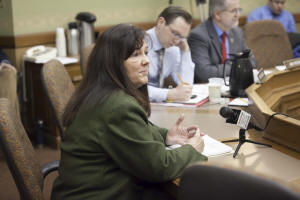 Last
week, I testified in favor of legislation I authored,
Assembly Bill
647, before the Assembly Committee on Energy and Utilities. Currently,
there is $6,000,000 in funding for grants to expand broadband service to
underserved areas of the state, but the Public Service Commission (PSC) is
prohibited from making more than $1,500,000 in grants in a fiscal year. To
keep up with demand, this bill eliminates the prohibition and allows the PSC
to allocate the grants until funding is depleted. It will ensure that the
funds for the grant program can continue to be used to extend broadband
access to underserved areas. Last
week, I testified in favor of legislation I authored,
Assembly Bill
647, before the Assembly Committee on Energy and Utilities. Currently,
there is $6,000,000 in funding for grants to expand broadband service to
underserved areas of the state, but the Public Service Commission (PSC) is
prohibited from making more than $1,500,000 in grants in a fiscal year. To
keep up with demand, this bill eliminates the prohibition and allows the PSC
to allocate the grants until funding is depleted. It will ensure that the
funds for the grant program can continue to be used to extend broadband
access to underserved areas.
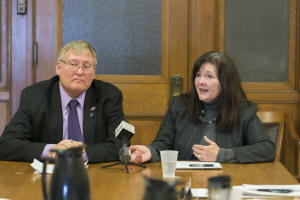
I had the
opportunity to testify in favor of legislation I authored,
Assembly Bill
610, before the Assembly Committee on Consumer Protection. The bill will
allow courts to impose a more fitting penalty for crimes against the elderly
or disabled. Under certain conditions, the bill will allow a court to impose
a supplement forfeiture for certain violation. This will help protect and
shield Wisconsin’s most vulnerable citizens.
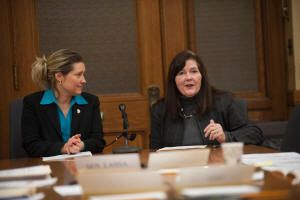
Senator Julie
Lassa (D-Stevens Point) and I testified in favor of legislation we authored
together before the Senate Committee on Workforce Development, Public Works,
and Military Affairs. The legislation,
Assembly Bill
351, is relating to Wisconsin’s Children First Program, administered by
the Department of Children & Families, which assists non-custodial parents
who are unemployed or underemployed obtain jobs.
The following
is a list of additional legislation I authored or co-authored that has
received a public hearing lately:
Assembly Bill
541 would create a $500,000 grant program in WDVA to be used by the
department to provide grants to veterans, employers, and nonprofit
organizations to improve employment outcomes for veterans. The grants would
be focused on veteran entrepreneurs, giving employers incentives to hire
veterans, with a focus on veterans with a service-connected disability, and
job training.
Assembly Bill
609 is relating to libraries and delinquent accounts. Due to privacy
protections, libraries have no means by which to collect from those who are
abusing their borrowing privileges. Since libraries are supported through
tax dollars, the financial loss of unreturned library materials and unpaid
fines ultimately falls on taxpayers and other library users. This
legislation will provide libraries with a method to collect fines and
reimbursement for overdue materials on delinquent library accounts.
Assembly Bill
713 will make changes to the current prior authorization process for
mental health services under the Medical Assistance program. This bill
reduces the amount of non-essential information needed for prior approval,
shortening the time needed to complete the prior approval request.
Eliminating non-essential requirements will result in earlier intervention,
increased treatment, and facilitate better outcomes.
Assembly Bill
664 would permit licensed treatment professionals, which include
qualified treatment trainees, to provide mental health services in schools
without establishing a branch office in the school. The change will reduce
administrative burden and costs for mental health therapists who are often
paid less than costs for the critical care that they provide students.
Reducing red tape will make it easier for mental health professionals to
provide services at schools. When mental health therapy is available at
school, students are more likely to access treatment and miss less class
time than when they have to travel to an off-site clinic.
Assembly Bill
734 will create a new pilot program designed to assist schools,
students, and parents in career and workforce education. It will be a
competitive grant program for the 12 Cooperative Education Service Agencies
(CESA) to apply for. The duties will include workforce education, business
development outreach, coordination between businesses and schools, and
apprenticeship and job training opportunity advancement. Additionally, they
will work to assure that students and their families receive sufficient
career and academic counseling to make informed choices.
Assembly Bill
781 creates an annual sales tax holiday on back-to-school items for two
days during the first weekend in August. Not only will this help families
keep more money in their pockets, but most importantly it will help ease the
financial burden of making sure their children are prepared for the upcoming
school year.
Assembly
Bill 140 directs the Department of Administration (DOA), with the
assistance of DHS, DCF, and DWD, to prepare a feasible plan that will
provide all public assistance recipients an annual statement of the benefits
they receive. This would require the departments to collaborate and develop
a streamline method of sharing their data in order to provide people with a
tangible way of knowing how much they receive and from which program.
Assembly Bill
744 is part of the College Affordability Legislative Package to address
student loan debt and increase the success of college students. This bill
requires all higher ed institutions in the state to provide a letter to
students at the beginning of every academic year containing information such
as the total amount of debt accrued under the loan to date, interest rate
applicable to the loan, standard repayment terms for the type of loan
estimated monthly payment due, projected amount of interest to be paid,
estimated total cost of attendance at the institution of higher education
for the academic year, including actual or estimated costs of tuition, fees,
and room and board, etc.
Sincerely,

|

